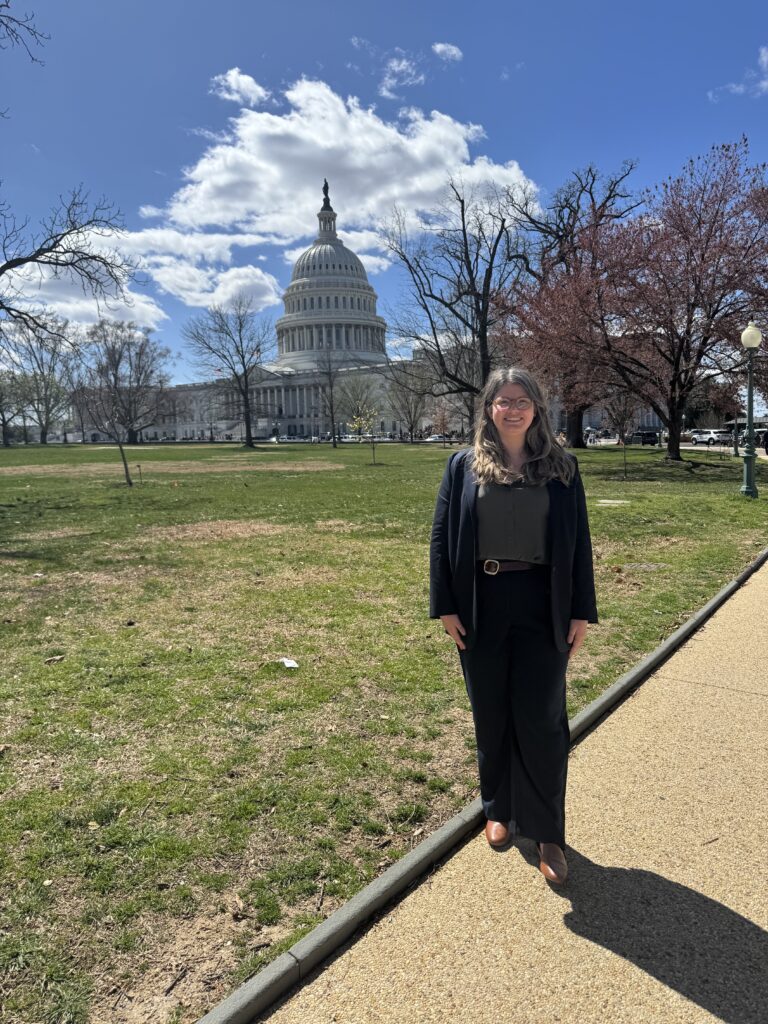ESA’s Katherine S. McCarter Graduate Student Policy Award (GSPA) recognizes graduate students who are passionate about science and policy. Since 2007, ESA has been bringing GSPA awardees to Washington, D.C. for policy and communications training, career development and meetings with policymakers. The 2025 cohort of ten students includes Sarah Cuprewich, who shares her perspective on science policy and what it was like to participate in this year’s events. Her views are her own, and not necessarily those of ESA or her home institution.

Photo courtesy of Sarah Cuprewich
The 2025 ESA Graduate Student Policy Award (GSPA) event held in Washington, DC in March was a fantastic foray into the complex and fast-paced world of federal science policy. Over the course of a couple days, we took a deep-dive into the federal budget, learned about career paths from several accomplished science policy professionals and worked in teams (Go Team VT-NH-AL!!) to refine our pitches for Hill Day. While I’ve had an interest in science policy for some time, the ESA GSPA provided my first opportunity to gain hands-on experience — and my first time wearing a suit!
My involvement with an international science diplomacy and education program called the Joint Science Education Project (JSEP) since 2022 is what most inspired my interest in science policy. This NSF-funded program brings teenagers, educators, scientists and graduate students to Greenland to learn and teach about Arctic ecology and physical sciences in a rapidly warming environment. While the Arctic field school is a blast, JSEP also taught me that science is more than gathering evidence; science is a conversation with your audience. Because of the two-way dialogue that it can provide space for, science is uniquely situated to be used as a diplomatic tool. In fact, JSEP was originally developed through an NSF and U.S. State Department collaboration with that exact result in mind. I was simply awestruck to see the power of science diplomacy at work and immediately sought deeper involvement in the world of science policy.
While JSEP can serve as an excellent example of federal funding success, federal support for ecological science should go beyond these high-level international collaborations. Ecological problems are complex and often cross jurisdictional boundaries. Ecologists need monetary and infrastructural support across large spatial scales (which makes relying on the private sector, state or municipal governments a challenge) to do ecological research with the most relevance to how ecosystems function and environmental problems manifest across the landscape. This kind of research simply would not be possible without federal investment and support, which is something elected officials need to hear directly from ecologists to fully understand.
The GSPA program put together by ESA was an enlightening introduction to federal science policymaking. I learned about the chaotic federal budget process and how to interact with congressional staffers. I was pleasantly surprised by the staffers’ openness and willingness to listen; the staffers actually care about what constituents come to discuss. In addition, I was shocked at how simple it is to book constituent meetings with my congressional delegation and walk around the buildings on Capitol Hill.

Photo courtesy of Sarah Cuprewich
The federal policy process seems much more open and democratic (though moving on a slower timeline) than some media would have you believe. Lawmakers really do want input from constituents, and all constituents should feel empowered to request a meeting with their politicians, not just those of us who were lucky enough to have ESA support. Speaking of luck, I even ran into my Vermont Representative, Becca Balint, after meeting with her staff — the absolute highlight of my time in DC!
Through this experience, I feel empowered to attend meetings and have an overall higher level of engagement with my congressional delegation and local politicians to discuss things I care about, and I have been encouraging my colleagues and friends to do the same.
I heartily encourage other ecologists who have an inkling of interest in science policy to take advantage of similar opportunities. I found the GSPA to be a great way to learn how to do science for maximum positive societal impact by understanding exactly how science is used in the policymaking process. I feel more confident in my ability to pose research questions that will provide relevant data to help communities and lawmakers make informed decisions based on the best available science.
My involvement in this event also reinforced my belief that science is never objective. The “facts” we uncover are always situated in sociopolitical contexts that shape which research questions we ask, who funds our work and other aspects of the scientific process. Science works best in conversation with society, and science policymaking — by creating rules and regulations that ethically frame the society-environment relationship — is a great conduit to start that conversation.
Lawmakers really do want input from constituents, and all constituents should feel empowered to request a meeting with their politicians, not just those of us who were lucky enough to have ESA support.
– Sarah Cuprewich, 2025 GSPA Awardee
